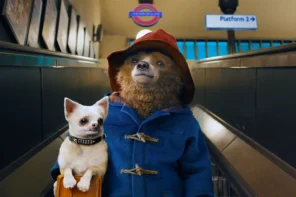CW: Police brutality, strong language, references of sexual assault, spoilers
Three Billboards Outside Ebbing, Missouri is a the perfect film to watch once and never think about again (until the time comes to nominate it for awards, of course). All its pleasures are on the surface and impossible to miss, and all its deeply rooted flaws only come to light after days and nights of agonizing thought. Frances McDormand, Sam Rockwell, and Woody Harrelson are all terrific, much too terrific to be trapped inside Mildred Hayes, Jason Dixon, and Bill Willoughby. The dialogue is wildly enjoyable on a first pass before you really think about what’s being said. The film touches on the largest themes of the current era: grief, death, police brutality, sexual assault, racism, the degradation of small town America. It’s admirable until you take a closer look at what it’s really saying about them. Don’t look too hard at this film, the cracks in the billboards are fatal to the image.
Not that it’s easy to look hard at this film in the first place. McDonagh opens the film with a prologue of many lingering, gorgeously composed shots of the rusted billboards with faded 1980s advertising still there, the billboards having crumbled in small town America in many ways. Unfortunately, the rest of the film looks like ass. McDonagh’s theatrical background imprisons every scene into medium close-up, handheld, shot-reverse-shot, white bread coverage with a glass of milk; the actors were directed but the camera sure wasn’t. Worse yet, the bad colour correction turns the film’s imagery into a dull, sludgy mess, which the film’s landscapes (which look nothing like Missouri) suffer worst.
The plot of the film again seems brilliant on a first pass, but McDonagh is so enamoured of his perfectly engineered morality play that he fails to pick up on how obvious and cheaply he structures the film
McDonagh overcompensates for the lack of cinema by packing on the dialogue: snappy quips, setups, punch lines, and punch lines for setups that happened three scenes ago. McDonagh is easily the most distinct of Tarantino’s cannibals, but he falls into the common trap befalling them all. The best dialogue, including the best of Tarantino, is just as much about what’s unsaid, but McDonagh leaves nothing unsaid. At every moment, the film calls attention to how aggressively written its dialogue is, and McDonagh can’t resist profanity for the cheapest of shock value. In one early scene, Mildred delivers a fiery monologue about “kid fucking” to the town’s Catholic priest (McDonagh, Irish, overestimates the number of Catholics in the American South). This scene exists only so that we can cheer Mildred on, and don’t get me started on McDonagh’s use of the n-word and its use in an exchange about “African American torturing” in prison.
The plot of the film again seems brilliant on a first pass, but McDonagh is so enamoured of his perfectly engineered morality play that he fails to pick up on how obvious and cheaply he structures the film. For example, early in the film Chief Willoughby says of Mildred’s daughter: “This is the type of case that’s solved much later by overhearing the perp bragging about the crime in a bar,” and much later, twist, Dixon overhears that very conversation in a bar, and then it turns out, double twist, the guy didn’t do it after all! How realistic that McDonagh subverts our expectations a second time! This is the dumbest sort of realism that shows up more often in hacky screenplays than reality. Worse, McDonagh relies only on the cheapest, most obvious signifiers to display character: Chief Willoughby is a vulnerable tough guy, so he’s a cop with cancer; Mildred Hayes is tough-as-nails but still sensitive, so she has a smoke and has a tough chat with a passing deer (in the worst CGI of the year); Jason Dixon is a pathetic man-child, so he lives with his racist mother and reads old comic books literally labeled “Robot Comix” (this film won a Golden Globe for Best Screenplay). And in the film’s second half, these cheap character definitions start coming and they don’t stop coming; they’re aggressively predictable at best and awfully problematic at worst.
McDonagh is so allergic to ambiguity that even when it’s necessary, it’s missing
Those North Carolina landscapes are exhibit A that the phony Ebbing, Missouri in the title, as critic Vadim Rizov suggests, was “chosen primarily for its currently quite fresh association with racism in Ferguson.” The film should’ve just been titled Three Billboards because there’s nothing to grab onto. McDonagh works best when his settings are as exaggerated as his dialogue. Bruges isn’t set in Bruges so much as it’s set in “Bruges,” ditto for the “Los Angeles” of Seven Psychopaths. Here, McDonagh flattens the American south into a rusty formless caricature, like everything about the film (except for the performances), it’s totally obvious and paper thin. And with that flat portrayal comes a clumsy at best and inexcusable at worst handling of its politics.
As a film about the police, it’s stunning the way McDonagh manages to extract failure from the jaws of success. The film seems to argue in its first half that the police department of Ebbing, in Mildred’s own words, are “too busy torturing black folks to solve the real crimes.” But in the second half, when Ebbing gets its first black police chief, the unjust prisoners are released, the racist cop is fired, and it seems that the police department’s flaws have to do with a couple bad apples who screwed everything up for the Good Guy Cops like Chief Willoughby, who the film presents as a moral centre (though still flawed because he curses when his kids are around, what a complex character definition). This begs an important question that McDonagh can’t answer: if Willoughby was such a good guy, and Dixon’s racism is such an open secret, why wasn’t he fired before? McDonagh is so allergic to ambiguity that even when it’s necessary, it’s missing.
In McDonagh’s Moral Universe the most racist white cop is allowed three dimensions, a sad homelife, a tragic past, and a redemption arc (a contentious one, contended below) but a black victim of his crime is allowed only to be a signifier or a signpost
The film presents Jason Dixon, a racist white cop, as a character who deserves our sympathy, yet gives none of its black cast a similar arc. None of them are characterized to the degree that even the most marginal white member of the supporting cast is. They’re in the film, as critic K Austin Collins points out, to be in the shot whenever a cop does wrong, “hovering somewhere in the background, playing silent witness, to make a point of that injustice.” In McDonagh’s Moral Universe the most racist white cop is allowed three dimensions, a sad homelife, a tragic past, and a redemption arc (a contentious one, contended below) but a black victim of his crime is allowed only to be a signifier or a signpost. We’re even told explicitly, in a posthumous letter written by Chief Willoughby (Best Screenplay), that Jason Dixon is “a good person deep down.” He’s not.
The most common retorts to the film’s racial problems are the film never redeems Dixon for his racism, and the film is not about race (two retorts which contradict each other). But the film does emphatically redeem Dixon even if the screenplay doesn’t: every scene following his assault of the ad agency is structured like a redemption arc and peppered with the imagery and signifiers of a redemption arc. Dixon reads a letter from his dead mentor, is reborn in fire (literally), facially disfigured as a permanent reminder of his past crimes (literally!), offered an orange juice olive branch in the hospital from one of his past victims, and then he takes a righteous beating in a bar for doing the right thing, fails yet again, returns to his mother, poses with a gun in a shot suggesting suicide, and then makes amends with the woman that he’s wronged and drives off into the sunset with her (literally!!). Whatever complicated sad-sack sympathy McDonagh is shooting for in the text is superseded by this formal structure, basically the Irish Catholic Redemption Greatest Hits. But that second retort, the film isn’t about race, is worse. This is a film about the role of a police officer in an American town, it’s about race whether McDonagh wants it to be or not.
Every time I find myself wanting to be charitable to this film because of the brilliant performances, I think about the film’s worst scene. It’s a flashback, the film’s only flashback, wholly out of place and present solely to deliver the audience exposition (Best Screenplay), the last conversation between Mildred and her daughter, leaving for a party, who we know will be raped and murdered that night. Angela, fighting with her mom, shouts “I hope I get raped on the way!” Mildred replies “I hope you get raped too!” You couldn’t write a worse scene if you tried. This scene is proof that the problems with the film’s racial content are the problems with the whole the thing. I like McDonagh as a filmmaker, believe it or not, but he doesn’t have a clue what he’s doing here, and he is guilty of all the sins he would like to forgive his characters for. He should stick to stories that aren’t set in the real world, or at the very least set in Ireland.








